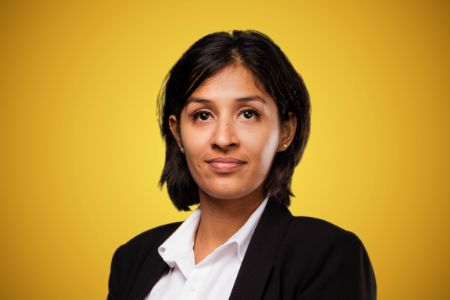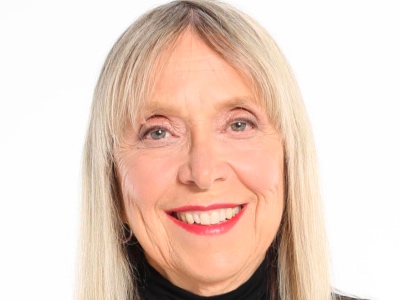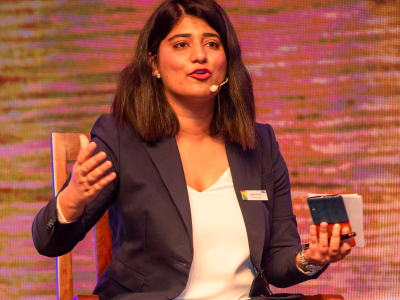
Caroline Boudreaux, founder of The Miracle Foundation began a dream 15 years ago of helping India’s orphan children thrive – in loving improved orphan homes, that nuture children to their fullest potential.
Caroline Boudreaux founded the Miracle Foundation in 2000, after she visited India for the first time.
From the first moment she met a group of more than 100 orphaned children and witnessed their beautiful smiles and incredible potential, she committed her life to helping them realize that potential.
Caroline was born and raised in Lake Charles, Louisiana and attended Louisiana State University where she earned a Bachelor of Science in Psychology. Prior to her nonprofit work, she had a successful career in media advertising. For her achievements with the Miracle Foundation, Caroline was presented with the Hope Award in 2005 and the Impact Award in 2008.
In 2009, she was invited to join the Young Global Leaders, a community of the World Economic Forum. She has been featured in various forms of media, including People.com, Forth Women to Watch over 40, CNN, Austin Woman Magazine, and “One Peace at a Time,” a 2009 film by Turk Pipkin.
In 2011, Caroline completed a prestigious course on Global Leadership and Public Policy for the 21st Century at Harvard Kennedy School.
Tell us about yourself, your background and what you do currently
At age 28, I was an account executive at a TV station making more money than I had ever dreamed of, but I felt empty inside. I was sure there was more to life. About that time, I decided to travel the world with a friend. As we plotted our course, she insisted that we visit India so she could meet a young boy she had been sponsoring.
I was skeptical. I thought it was a scam and that she was wasting her money, but in May 2000 we had made our way to the small Indian village where the child my friend was sponsoring lived. I couldn’t believe he was real. My friend was absolutely thrilled to meet him and see how her money had been helping him and his family.
A few days later we were invited to dinner at a local home. Nothing could have prepared us for what we were to encounter there: Over a hundred beautiful, hungry, smiling, orphaned children our host had taken in over the course of nearly two decades. I had never seen an orphan before in my life and here were over a hundred vying for our attention and love.
A little girl named Sheebani came and put her head on my knee. I rocked her to sleep and when I went upstairs to put her into her crib, I was shocked to see that there was only a room filled with hard, wooden-slatted beds. As I laid Sheebani down on those wooden boards, I broke.
That day was auspicious–it was Mother’s Day. Right at that moment, I decided I had to do something to help parentless children. The idea for Miracle Foundation was born.
So I returned home, left my lucrative television-advertising career, and founded a nonprofit committed to empowering children without parents to reach their full potential. I had never worked for an NGO before, but I was so committed to helping, I was convinced I could work through every barrier in my way.
I won’t lie. It hasn’t been completely smooth sailing since then. But I’m proud of hiring and working with the right people to figure out how to truly change the lives of the children we serve. Surrounding myself with experts and giving them the room and tools to do their jobs has made our organization what it is today.
Tell us about any current projects or initiatives you wish to promote
Our biggest goal right now is to transform every orphanage in the entire Indian state of Maharashtra through partnerships with the state government and other NGOs. Once we prove that it can be done, we plan to expand our model to children who need it all around the globe!
What has been your biggest challenge in achieving your success?
The biggest challenge faced by an NGO is the ability to help enough people. That, of course, is a matter of raising enough money to care for the thousands of children we support. And, the way to do that is to show donors where their dollars are going and the impact they’re having. The measurability of our interventions ensures we know the exact impact of donations, which enables us to provide full transparency and maintain integrity to our donors, whether they give 100 rupees or 100 lakhs.
What has been your greatest achievement personally?
Measuring impact. This is so hard to do, but it’s a necessity. Many years ago, before we developed our extensive vetting process, we learned the hard way that not everyone has the best interest of the children at heart. I hated to stop helping children just because their leaders were corrupt or greedy, but had to make those tough decisions. It was painful, but a big part of how we got so metric- and process-driven. Unfortunately, we are unable to convince some leaders to maintain financial transparency. It’s sad because the children are the ones who suffer. However, the challenge of overcoming corruption made us engineer a metric-driven process that measures impact for children.
It is this measurement tool that sets us apart and enables people to genuinely know how they’re doing in providing children all their rights.
If you weren’t doing what you do now, what would you be doing?
Making a ton of money! I was a natural salesperson; I never would have left the industry had I not found my purpose. What is great about what I do now is that I get to use my natural abilities to do so much more than sell something. I get to bring purpose to people’s lives and help them make a difference. What I left on the table in financial benefits, I gained in purpose and fulfilment. If I had not found this mission and these kids, I would still be searching for that purpose.
Who has been your biggest inspiration?
The children are my inspiration. My dream is for every orphaned child to have a loving family and feel a sense of belonging.
And, until every child has a loving family, we won’t quit. I truly believe that, in one generation, we can end the suffering of children without parents—that’s what keeps me motivated. It will take a concerted effort from governments, NGOs, and caring donors, but it is possible. And how could we not help these little angels?
What does the future hold for you?
We’re exploring partnerships with other state governments and organizations in the orphan care space. One initiative we’re particularly excited about is partnering with organizations doing great work in adoption and foster care. Whenever possible, we resettle children to live with their extended family. And if a child doesn’t have extended family who can provide quality care, we ensure the care that child receives is the best possible.
I’ve always been open to saying “YES” to new opportunities—new hobbies, new connections, new friendships, new foods, new experiences, new countries. And it’s opened countless professional, and personal doors throughout my life. While I’m not sure what new opportunities are around the corner for me, I’m certain I’ll be open to saying “YES” to them.






